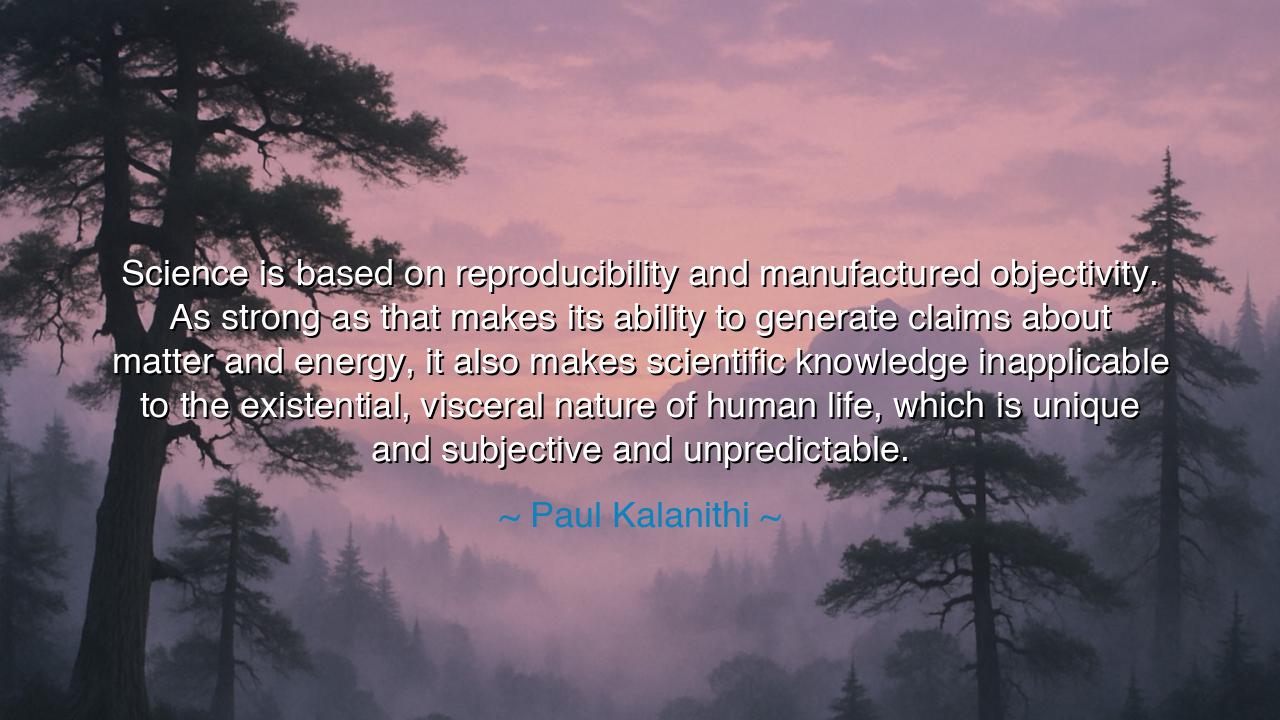
Science is based on reproducibility and manufactured objectivity.
Science is based on reproducibility and manufactured objectivity. As strong as that makes its ability to generate claims about matter and energy, it also makes scientific knowledge inapplicable to the existential, visceral nature of human life, which is unique and subjective and unpredictable.






“Science is based on reproducibility and manufactured objectivity. As strong as that makes its ability to generate claims about matter and energy, it also makes scientific knowledge inapplicable to the existential, visceral nature of human life, which is unique and subjective and unpredictable.” — Paul Kalanithi
In this profound reflection, Paul Kalanithi, a physician and philosopher of the human condition, speaks from the edge of two worlds—the measured precision of science and the raw, unpredictable wilderness of life. His words are not a dismissal of science but a reminder of its limits. Science, with all its power to explain, to predict, and to create, is a system built upon reproducibility—that which can be repeated, tested, and proven by all. Yet, the human soul cannot be placed under a microscope. The mystery of existence, the ache of love, the weight of sorrow, and the light of hope—these are beyond the reach of formulas and laboratory truths.
Kalanithi, who faced death as both healer and patient, understood this truth intimately. As a neurosurgeon, he wielded science as a sword against disease. He knew the intricate dance of neurons, the map of the human brain, the measurable patterns of life and death. Yet when the shadow of cancer fell upon him, the very science he had mastered could not answer the questions that filled his heart. Science could tell him how he was dying, but not why he had lived. It could measure the decay of his body, but not the meaning of his existence. And thus, he discovered that while science governs the physical, it is powerless before the existential—the realm of meaning, love, and the soul’s longing for eternity.
The ancients, too, knew of this boundary between knowledge and wisdom. The philosophers of Greece and the mystics of the East all spoke of the two lights by which man sees—the light of reason and the light of spirit. Science is the first: clear, steady, revealing the outer world. But the second, the inner light, flickers with divine mystery and reveals the truths of the heart. To live by science alone is to see only the surface of things; to live by spirit alone is to drift into darkness. The wise seek balance between them—reason to guide the mind, and faith to nourish the soul.
Consider the story of Albert Einstein, who unlocked the secrets of time and space, who bent the cosmos with equations. Yet even he, that titan of intellect, once said: “The most beautiful thing we can experience is the mysterious. It is the source of all true art and science.” He knew that the deepest truths—the awe that stirs the heart, the wonder that makes life sacred—cannot be contained in mathematical symbols. He understood, as Kalanithi did, that science reveals the structure of reality, but it is the human spirit that gives it meaning. Without that, the stars themselves are but cold fire, burning in a silent void.
And so, manufactured objectivity, that strength of science, becomes also its limitation. For life is not reproducible. Each soul is an unrepeatable miracle. The embrace of a child, the agony of loss, the tremor of courage in the face of despair—these cannot be standardized or replicated. The human experience defies all attempts to be measured or predicted. Science may teach us how to prolong life, but it cannot teach us how to live it. It may describe the electrical impulses of the brain, but it cannot fathom the thoughts that lead a man to love, to forgive, or to sacrifice.
From this truth arises a sacred lesson: let science serve the body, but let wisdom guide the heart. Use reason to master the material world, but never allow it to rule over the mystery of being. In the face of suffering, do not seek only explanation, but also meaning. In the presence of death, do not ask only for cure, but for grace. For the true measure of a life is not in the data of its length, but in the depth of its love.
Therefore, dear listener, honor both paths. Learn the language of the stars, but never forget the poetry of the soul. Let science illuminate the mind, but let compassion illuminate the heart. When the known reaches its limits, let the unknown whisper its wisdom. For man was not made to live by equations alone, but by the union of knowledge and wonder, of truth and meaning. This is the secret Kalanithi left to us—that though science may explain how we live, it is the existential, visceral, unpredictable beauty of life that teaches us why we are here at all.






AAdministratorAdministrator
Welcome, honored guests. Please leave a comment, we will respond soon